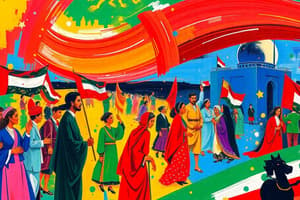Podcast
Questions and Answers
What was one immediate effect of disconnecting the internet during the protests?
What was one immediate effect of disconnecting the internet during the protests?
- It allowed the government to gather more intelligence.
- It strengthened the message of the protesters.
- It increased the number of activists participating online.
- It silenced the voices of activists. (correct)
Which class was predominantly highlighted as the driving force behind the uprisings?
Which class was predominantly highlighted as the driving force behind the uprisings?
- The educated middle class (correct)
- The elite upper class
- The technocrats
- The labor class
What is a primary characteristic of the political life in GCC countries, particularly in relation to dynastic authority?
What is a primary characteristic of the political life in GCC countries, particularly in relation to dynastic authority?
- Challenge to democratic governance
- Promotion of grassroots activism
- Lack of opposition to dynastic rule (correct)
- Acceptance of diverse political ideologies
What was the media's portrayal of the technology's role in the uprisings?
What was the media's portrayal of the technology's role in the uprisings?
How does the societal structure in Bahrain differ from that in other GCC countries?
How does the societal structure in Bahrain differ from that in other GCC countries?
What was particularly notable about the crowds at Tahrir on January 28?
What was particularly notable about the crowds at Tahrir on January 28?
What misconception about class influence is challenged by the protests at Tahrir?
What misconception about class influence is challenged by the protests at Tahrir?
What percentage of the total GCC population is typically made up of nonnationals?
What percentage of the total GCC population is typically made up of nonnationals?
In 2010, what was the approximate percentage of UAE citizens in relation to the total population?
In 2010, what was the approximate percentage of UAE citizens in relation to the total population?
What consequence do noncitizens in GCC countries often face for agitation and protests?
What consequence do noncitizens in GCC countries often face for agitation and protests?
Flashcards
Arab Spring uprisings
Arab Spring uprisings
A series of protests and uprisings in the Arab world that began in 2010. These movements were largely driven by social media platforms like Facebook and Twitter, which helped to mobilize and coordinate activists.
Western Technology's Role
Western Technology's Role
The text emphasizes the role of Western technology in facilitating the Arab Spring uprisings, pointing to the use of social media, computers, and communication tools.
Middle Class's Agency
Middle Class's Agency
The excerpt highlights the role of the middle class, particularly those with access to computers and social media, in driving the revolutions.
Real-World Communication
Real-World Communication
Signup and view all the flashcards
Tahrir Square
Tahrir Square
Signup and view all the flashcards
GCC Political Life
GCC Political Life
Signup and view all the flashcards
Guest Worker Community
Guest Worker Community
Signup and view all the flashcards
Demographic Imbalance
Demographic Imbalance
Signup and view all the flashcards
Singapore Quality
Singapore Quality
Signup and view all the flashcards
Swift One-Way Ticket
Swift One-Way Ticket
Signup and view all the flashcards
Study Notes
National Identity in the UAE and its Capacity for Social Transformation
- Arab uprisings were an exhilarating period of change in the Middle East
- Social media played a significant role in these events, including instances of citizens using it for communication and organization
- Western media often portrayed the uprisings as a triumph of advanced technology, particularly social media
- This perspective overlooked the role of other factors, such as pre-existing political and economic issues
- The UAE did not experience the same level of uprising as other countries in the region
- This difference likely stems from a unique combination of factors, including class structure, state legitimacy, and cultural identity
- Disparity between citizens and resident workers was a noteworthy feature of UAE society
- Social media use was high in the UAE, but the structure of the country meant social media was not used to foster widespread social unrest
- A particular feature of the UAE was large numbers of non-citizen workers
- This high level of non-citizen worker presence contributed to the relative stability of the UAE, contrasting with the social unrest elsewhere in the region
- Youth in the UAE are highly involved with social media and using the media to connect across wide distances
- There is a generational gap in understanding and accessing technology, which impacted the ability of generations to connect and mobilize for social change
- Emiratis have adopted modern values but also retained some traditional ones, leading to a divided identity
- Cultural heritage, history, and national pride are being promoted to counter the overwhelming influence of modern media
Studying That Suits You
Use AI to generate personalized quizzes and flashcards to suit your learning preferences.




